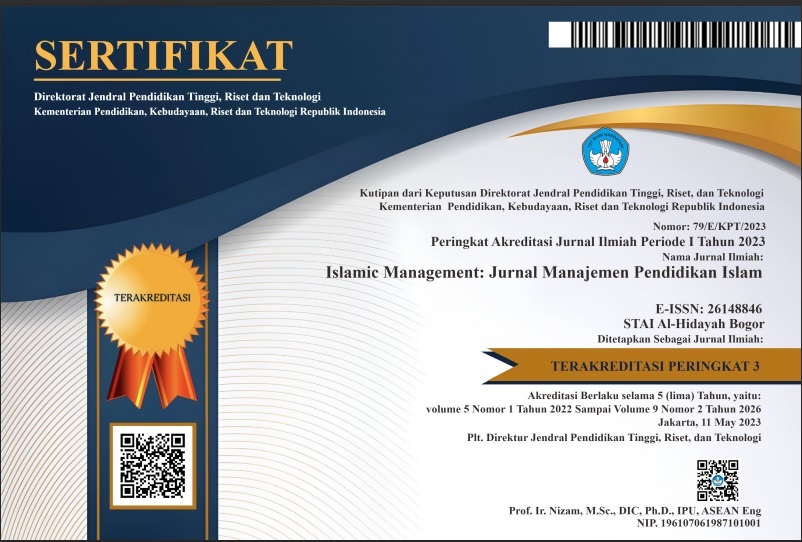MANAJEMEN PESERTA DIDIK DALAM PERSPEKTIF PENDIDIKAN ISLAM
DOI:
https://doi.org/10.30868/im.v2i02.514Abstract
In the time of the development of various kinds of disciplines including the science of education, Islam was present as an ideal concept and a perfect model while answering various challenges from the various problems of the development of education. At a time when many Muslims themselves are unaware of the concepts and models of Islamic education and glare with theories, concepts, and models of non-Islamic education. Many institutions labeled Islam, but in reality are still far from the truth, so the graduates are still far from the hopes of the nation and Islam itself. Therefore, to print Islamic put out, it is necessary for the management of tarbiyah to design, organize, implement and control humans so that as students can maintain their nature when carrying out their main duties as khalīfah fī al-ardh to maintain the balance and continuity of life on this earth not damaged by dirty hands that have been damaged and even lost their nature in the form of religion and morals. This paper explains the meaning of management in Islam and aims to find out the management intentions of students in the perspective of Islamic education.
Keywords: management, education, students.References
Ginanjar, M.H., dan As-Surur, M. (2018). Kepemimpinan Kepala Sekolah dan Pengaruhnya Terhadap Peningkatan Pedagogik Guru Pendidikan Agama Islam di SMP Negeri 3 Karawang Jawa Barat. Islamic Management: Jurnal Manajemen Pendidikan Islam, 01(02).
Maya, R., dan Lesmana, I. (2018). Pemikiran Prof. Dr. Mujamil Qomar, M.Ag. tentang Manajemen Pendidikan Islam. Islamic Management: Jurnal Manajemen Pendidikan Islam, 01(02).
Wangsadanureja, M. (2018). Urgensi Manajemen Pendidikan Pesantren dalam Keluarga. Islamic Management: Jurnal Manajemen Pendidikan Islam, 01(02).
Woodward LJ., Fergusson DM., dan Horwood LJ. (1999). The Effects of Single-Sex and Eoeducational Secondary Schooling on Children’s Academic Achievement. Australian Journal of Education.
Al-Asy’ari, A.D. (2000). Muqaddimah fÄ« Al-IdÄrah Al-IslÄmiyyah. Jeddah (KSA).
Al-BukhÄri, M.I. (1987). Al-Jami’ Al-Shaẖīẖ Al-Mukhtashar. Beirut: DÄr Ibn KatsÄ«r.
Al-Hazimi, K.H. (2000). UshÅ«l Al-Tarbiyyah Al-IslÄmiyah. Madinah Al-Munawwarah: DÄr ‘Ālam Al-Kutub.
Al-Hulwani, I.M. (2008). Manhajiyah Al-Ta’shÄ«l Al-IslÄmi li Al-IdÄrah Al-Tarbawiyyah. Makkah.
Al-RasyÅ«di, A.A. (2000). Al-Fikr Al-Tarbawi ‘Inda Al-Syaikh ‘Abd Al-RahmÄn Al-Sa’di. DammÄm: DÄr Ibn Al-Jauzi.
Al-Syathibi. (1997). Al-MuwÄfaqÄt. Riyadh: DÄr Ibn ‘AffÄn, Juz. 2. Tahqiq: Masyhur Hasan Alu SalmÄn.
Al-Quthb, M. (1978). NizhÄm Al-IdÄrah fÄ« Al-IslÄm. Kairo, Dar Al-Fikr Al-‘Arabi.
Imron, A. (2016). Manajemen Peserta Didik Berbasis Sekolah. Jakarta: PT Bumi Aksara.
Karami, A.'A. (1427). Al-IdÄrah fÄ« ‘Ashr Al-RasÅ«l. Kairo: DÄr Al-SalÄm.
Qomar, M. (2007). Manjemen Pendidikan Islam. Jakarta: Erlangga.
Ramayulis. (2010). Ilmu Pendidikan Islam. Jakarta: Kalam Mulia.
Rosyidin, D. (2009). Konsep Pendidikan Formal Islam. Bandung: Pustaka Nadwah.
Syafaruddin. (2005). Manajemen Lembaga Pendidikan Islam. Ciputat: Ciputat Press.
SyÄkir, A. (2005). ‘Umdah Al-TafsÄ«r ‘an Al-ḪÄfizh Ibn KatsÄ«r. Al-ManshÅ«rah-Mishr: DÄr Al-WafÄ’ li Al-á¹®ibÄ’ah wa Al-Nasyr wa Al-Tauzī’, Jil. 1. hlm. 2.
Tafsir, A. (2016). Filsafat Pendidikan Islami. Bandung: PT Remaja Rosdakarya.
Tim Dosen Administrasi Pendidikan Universitas Pendidikan Indonesia. (2013). Manajemen Pendidikan. Bandung: Al-fabeta.
UU Sisidiknas 2003.
Downloads
Published
How to Cite
Issue
Section
Citation Check
License
Authors who publish with this journal agree to the following terms:
- Authors retain copyright and grant the journal right of first publication with the work simultaneously licensed under a Creative Commons Attribution License that allows others to share the work with an acknowledgment of the work's authorship and initial publication in this journal.
- Authors are able to enter into separate, additional contractual arrangements for the non-exclusive distribution of the journal's published version of the work (e.g., post it to an institutional repository or publish it in a book), with an acknowledgment of its initial publication in this journal.
- Authors are permitted and encouraged to post their work online (e.g., in institutional repositories or on their website) prior to and during the submission process, as it can lead to productive exchanges, as well as earlier and greater citation of published work (See The Effect of Open Access).







